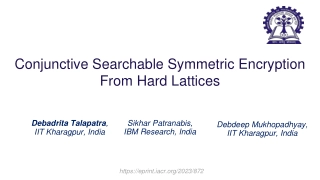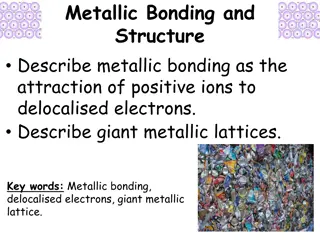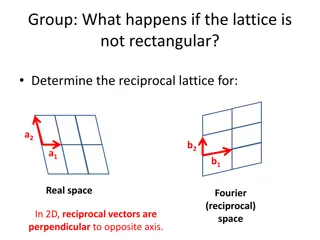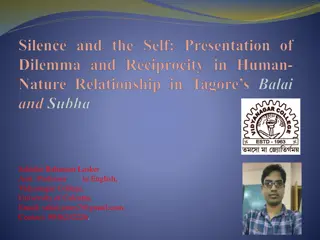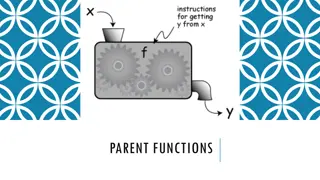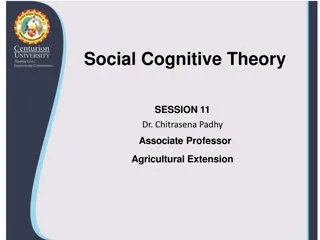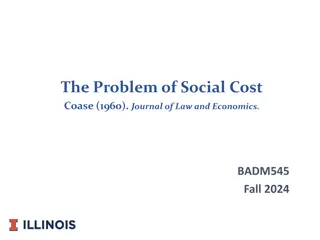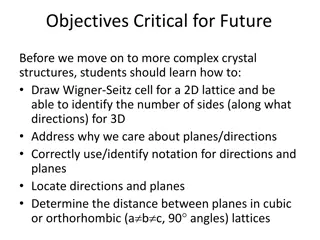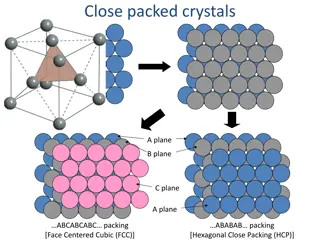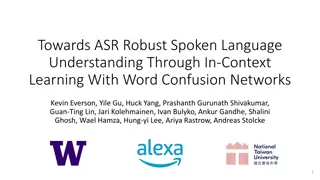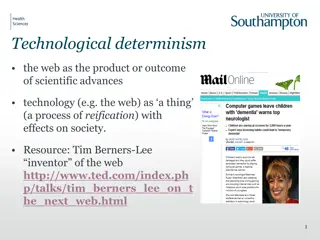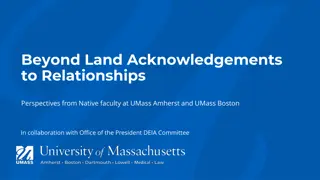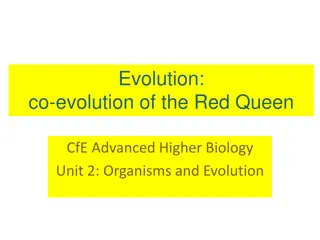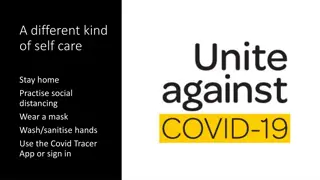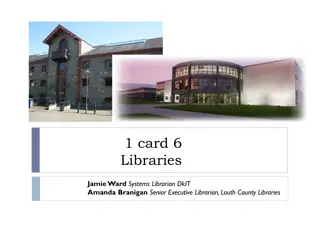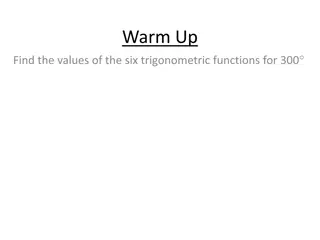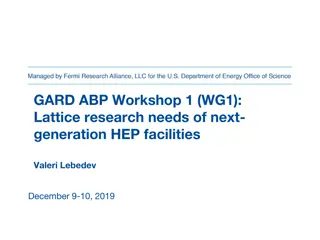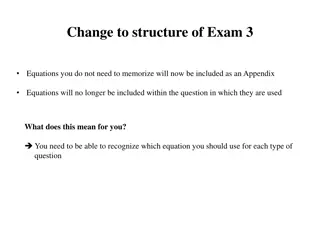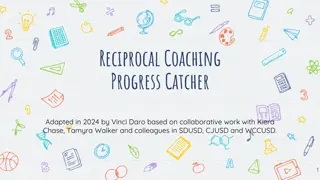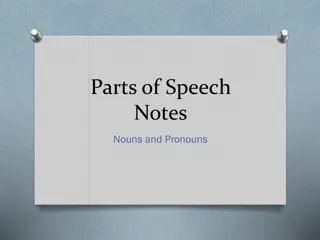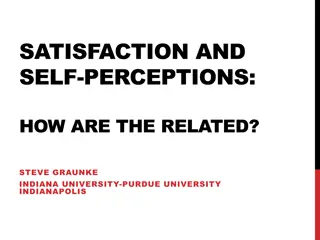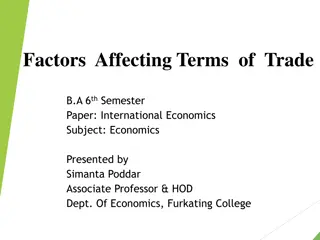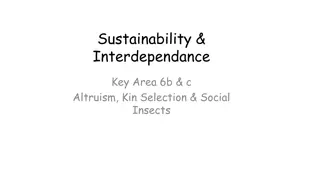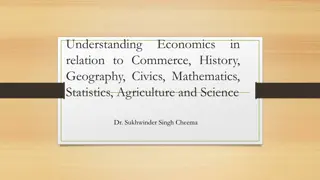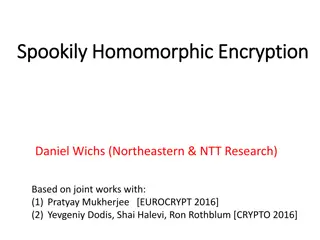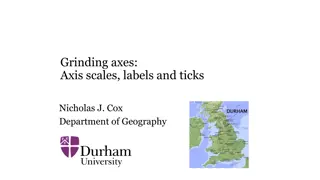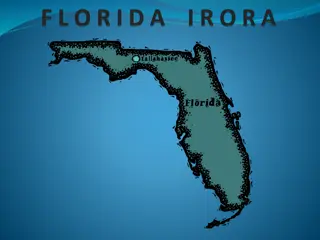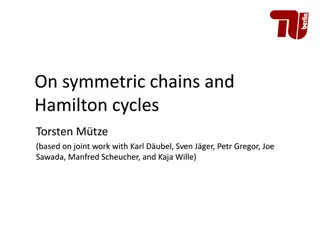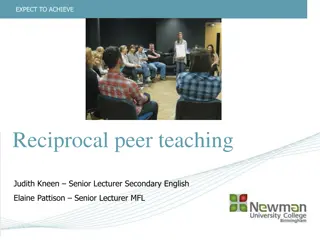Conjunctive Searchable Symmetric Encryption From Hard Lattices
Discusses outsourcing storage and computing, encrypted data computing, and searchable symmetric encryption for data security in cloud environments. It touches on topics like data confidentiality, user revocation, and performance-oriented implementations.
2 views • 30 slides
Mastering Networking for Career Development
Learn about ethical networking, common myths, building networks, and connecting with others. Discover the art of reciprocal relationships to achieve professional goals. Join the Professional Services Careers Club to enhance your networking skills!
4 views • 31 slides
Understanding Solid State Chemistry: Amorphous vs. Crystalline Solids
Solid state chemistry involves studying the differences between amorphous and crystalline solids, exploring their unique properties such as melting points, isotropic/anisotropic characteristics, and examples of each type of solid. Additionally, the classification of crystals into different crystal s
7 views • 62 slides
Understanding Crystal Structures and Types of Solids in Materials Science
Crystal structures in materials science involve the arrangement of atoms in solids, with examples of crystalline and amorphous solids like metals and glass. Explore concepts like energy packing, definitions of crystalline materials, unit cells, BCC and FCC lattices, HCP structures, and Miller Indice
10 views • 12 slides
Understanding Personality Development: Social-Cognitive and Behavioral Perspectives
Social-cognitive theorists view personality development as influenced by the interaction between individual traits and social context, while behavioral theorists focus on learning effects. They relate by emphasizing behavior learning through conditioning and observation, alongside mental processes.
0 views • 19 slides
Understanding Metallic Bonding and Giant Metallic Lattices
Metallic bonding involves the attraction of positive metal ions to delocalized electrons, forming giant metallic lattices. In this structure, positive metal ions occupy fixed positions while electrons move freely throughout. This bonding is different from covalent bonding as it is delocalized, leadi
1 views • 19 slides
Understanding Reciprocal Lattices in Crystal Structures
Explore the concept of reciprocal lattices in crystal structures, including non-rectangular lattices, Fourier space in 2D, Wigner-Seitz cells, Brillouin Zones, and the relationship between BCC and FCC structures. Learn about primitive lattice vectors, construction of the Brillouin Zone, and the sign
0 views • 49 slides
Exploring Nature and Human Relationships in Texts by Tagore
Ecocriticism in Tagore's works delves into the intricate dynamics between human, nature, and non-human elements. Nature is portrayed as a distinct entity, offering solace and companionship to characters like Balai and Subha in their silent yet profound interactions with the environment. Through uniq
0 views • 13 slides
Reduction of Feedback Overhead in IEEE 802.11be
Discussion on reducing channel acquisition overhead to support 16 Spatial Stream MIMO and Multi-AP coordination in IEEE 802.11be. Methods include limiting feedback information, using implicit feedback in reciprocal systems, and improving explicit and implicit feedback schemes.
0 views • 14 slides
Understanding Parent Functions and Their Characteristics
This informative content explores different parent functions such as linear, quadratic, cubic, square root, reciprocal, exponential, and logarithmic functions. It delves into their unique properties, graphs, and functions, offering insights into domain, range, and key characteristics of each functio
1 views • 11 slides
Exploring New Tyre Industry Career Paths and Job Profiles
Conducting research on career pathing in the new tyre industry to develop a catalogue of production jobs, map jobs to OFO, establish career lattices, and create tools for career planning. Focus on enhancing access to career information, promoting common understanding, and improving HR practices.
0 views • 22 slides
Understanding Social Cognitive Theory: Insights from Albert Bandura
Social Cognitive Theory, developed by Albert Bandura, emphasizes learning through observation and modeling behaviors. The theory explores how individuals acquire new behaviors, thoughts, and attitudes by observing others. Bandura's famous Bobo doll experiment showcased how children imitated aggressi
6 views • 17 slides
The Problem of Social Cost: Coase's Analysis and Revisions
Coase (1960) revisited Pigou's (1920) approach on harmful actions and externalities, emphasizing the reciprocal nature of the problem. He proposed considering social net products alongside private products, emphasizing the importance of rights and efficient resource allocation. This critical analysi
0 views • 12 slides
Understanding Crystal Structures: Unit Cell Definition and Wigner-Seitz Method
Learn essential concepts such as drawing Wigner-Seitz cells, identifying lattice directions, using direction/plane notations, locating directions/planes, and calculating distances in cubic or orthorhombic lattices. Explore various ways to define a unit cell within a lattice, including the Wigner-Sei
0 views • 25 slides
Understanding Crystal Lattice Planes and Indices
Exploring the significance of crystal lattice planes in determining parameters, diffraction methods, and orthogonal systems. Discover how to identify planes and calculate distances in various lattices using Miller indices. Visual aids provide clarity on hexagonal structures and symmetry in crystallo
0 views • 22 slides
Enhancing Spoken Language Understanding with Word Confusion Networks
Explore the integration of word confusion networks into large language models to improve spoken language understanding by addressing ASR errors and transcription ambiguities. The research focuses on leveraging ASR lattices for richer input representations and investigating the performance variations
0 views • 30 slides
Exploring the Relationship Between Technology and Society through Historical Perspectives
This collection delves into the complex interplay between technology and society, contrasting the deterministic view with the idea of reciprocal shaping. It examines various epochs from pre-modernity to the information age, highlighting how technology has influenced cultural shifts and modernity its
6 views • 28 slides
Exploring Land Acknowledgements in Academic Institutions: Perspectives from UMass Boston and UMass Amherst
Explore the significance of land acknowledgements in academic settings, focusing on the perspectives of Native faculty at UMass Boston and UMass Amherst. Understand the importance of developing reciprocal relationships with Indigenous communities and engaging in respectful dialogue towards creating
0 views • 9 slides
Understanding Co-evolution: A Closer Look at the Red Queen Hypothesis in Biology
Co-evolution refers to the reciprocal genetic changes in species in response to each other. The Red Queen Hypothesis, illustrated in the arms race between parasites and hosts, exemplifies this phenomenon. This interaction drives evolutionary dynamics in herbivores, plants, pollinators, prey, predato
0 views • 18 slides
Understanding Citizenship and Immigration in Modern Democracies
Citizenship, a fundamental institution of modern democracies, defines the relationship between individuals and the state through reciprocal rights and duties. However, citizenship has a dual nature, serving to both include certain individuals as citizens and exclude others. Immigrants residing withi
0 views • 21 slides
Self-Care and Community Wellbeing Reflections
Reflect on your 2020 experiences, values, and self-care practices to enhance personal and community wellbeing. Stay home, practice social distancing, wear a mask, wash hands, and use the Covid Tracer App. Embrace self-care as whanau care and community care. Explore what nourishes you physically and
0 views • 11 slides
Collaborative Partnership between Dundalk Institute of Technology and Louth County Libraries
The joint initiative aims to support the learning, knowledge, and cultural needs of County Louth residents by facilitating reciprocal borrowing, sharing staff practices, and enhancing library services. Despite facing challenges like data protection and differing regulations, the project is overcomin
0 views • 17 slides
Trigonometric Functions and Calculator Applications
Explore how calculators can be used to find trigonometric function values, approximate expressions, and determine angles using inverse trigonometric functions. Learn about evaluating functions in degree mode and utilizing reciprocal identities for accurate calculations.
0 views • 11 slides
Lattice Research Needs for Next-Generation HEP Facilities
Lattice research is vital for determining the characteristics of accelerators, colliders, and storage rings. High beam brightness is crucial for achieving goals like luminosity and beam loss reduction. The main barriers to higher beam brightness include instabilities and particle loss. General requi
0 views • 13 slides
Understanding Signatures, Commitments, and Zero-Knowledge in Lattice Problems
Explore the intricacies of lattice problems such as Learning With Errors (LWE) and Short Integer Solution (SIS), and their relation to the Knapsack Problem. Delve into the hardness of these problems and their applications in building secure cryptographic schemes based on polynomial rings and lattice
0 views • 44 slides
Understanding Coevolution: An Example from Wild Parsnip and Webworms
Coevolution, a reciprocal evolutionary change in interacting species, can be observed in the relationship between wild parsnip plants containing toxic compounds and webworms that can metabolize these toxins. This example demonstrates the prerequisites for coevolution, including genetic variation and
0 views • 35 slides
Reciprocal Coaching Framework for Professional Development
The Reciprocal Coaching Framework, adapted in 2024 by Vinci Daro in collaboration with educators from several school districts, emphasizes setting goals, identifying teaching actions, and collecting artifacts to facilitate a structured coaching process. Partnerships are established, individual goals
0 views • 27 slides
Understanding Nouns and Pronouns in Grammar
Dive into the world of nouns and pronouns with this comprehensive guide. Learn about different types of nouns such as concrete, abstract, collective, and compound nouns. Explore the distinction between common and proper nouns. Discover the role of pronouns as words that substitute for nouns, includi
0 views • 7 slides
Exploring the Relationship Between Academic Satisfaction and Self-Perceptions of Learning
Discussing the interplay between academic satisfaction and self-perceptions of learning, this study by Steve Graunke from Indiana University-Purdue University Indianapolis delves into models and statistical analyses using the IUPUI Continuing Student Survey. Examining how these constructs relate, th
0 views • 21 slides
Factors Affecting Terms of Trade in International Economics
Terms of Trade (TOT) in international economics represent the ratio between a country's export prices and its import prices, influencing its trade balance. Various types of TOT include Net Barter, Gross Barter, Income, Single Factoral, Double Factoral, Real Costs, and Utility terms. Major factors im
0 views • 4 slides
Understanding Altruism, Kin Selection, and Social Insects in Sustainability
Altruism, kin selection, and social insects play crucial roles in sustainability. Altruistic behavior, like reciprocal altruism and kin selection, benefits recipients while potentially harming donors. Social insects, such as bees and ants, exemplify cooperation and societal structures that aid in ec
0 views • 29 slides
Understanding Correlation in Economics and Education
Correlation in education refers to the technique of establishing reciprocal relationships between different subjects to enhance understanding. The etymological meaning of correlation stems from Latin roots, signifying interlinking. Various types of correlation such as vertical and horizontal correla
0 views • 33 slides
Enhance Conversations and Vocabulary with Word of the Day and ACT Practice Problems
Explore a weekly ROAR behavior tip emphasizing reciprocal questioning in interactions. Discover intriguing words of the day such as 'gauge,' 'hypothesis,' 'incremental,' 'larvae,' and 'mass,' along with sample sentences to grasp their meanings. Engage in ACT practice problems to boost your skills. U
0 views • 11 slides
Understanding Pronouns: Types and Usage in English Grammar
Delve into the world of pronouns with this comprehensive guide covering definitions, types, and examples of personal, demonstrative, interrogative, relative, indefinite, distributive, reflexive, emphatic, and reciprocal pronouns. Explore how pronouns function as essential parts of speech in English
0 views • 6 slides
Spookily Homomorphic Encryption Explained
Spookily Homomorphic Encryption, as presented by Daniel Wichs based on joint works with other researchers, explores concepts like Fully Homomorphic Encryption (FHE) and Multi-Key FHE. It delves into the why, what, and how of FHE, with a focus on distributed decryption and achieving non-local relatio
0 views • 37 slides
Mastering Graph Axes Customization: Techniques and Tricks
Explore advanced techniques for customizing graph axes by adjusting scales, labels, and ticks. Learn how to suppress ticks, modify label alignment, and work with non-standard scales like logarithmic or reciprocal. Discover ways to maintain consistent styles across a series of graphs and gain more co
0 views • 57 slides
Interstate Reciprocal Overpayment Recovery Arrangement (IRORA) and Its Implementation
Explore the Interstate Reciprocal Overpayment Recovery Arrangement (IRORA), an agreement among participating states for the recovery of benefit overpayments through offsetting. Learn about the membership details, duties of requesting and recovering states, and the history of out-of-state overpayment
0 views • 17 slides
Exploring Symmetric Chains and Hamilton Cycles in Graph Theory
Delve into the study of symmetric chains, Hamilton cycles, and Boolean lattices in graph theory. Discover the relationships between chain decompositions, Boolean lattices, and edge-disjoint symmetric chain decompositions, exploring construction methods and properties such as orthogonality. Uncover t
0 views • 15 slides
Enhancing Learning Through Reciprocal Peer Teaching in Higher Education
This presentation discusses the concept of reciprocal peer teaching in higher education, focusing on how students can take on teaching roles to enhance their learning experience. The speakers emphasize the benefits and strategies of peer teaching, providing a framework for implementing this approach
1 views • 20 slides
Understanding Geometric Frustration in Magnetism and Ice
Explore the concept of geometric frustration in magnetism and ice, where energetic requirements cannot be optimized simultaneously. Learn about frustrated magnetic insulators, quantum spin liquids, and the unique properties of geometrically frustrated systems such as triangular and Kagome lattices.
0 views • 25 slides
